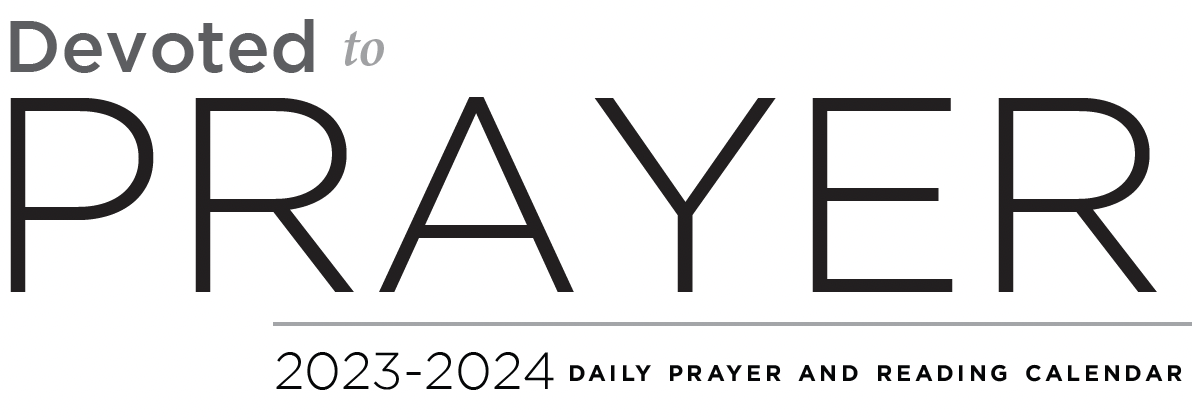
Thursday of the Third Week in Lent
You might not think that using logic when reading the Bible would be beneficial, but it really is. If you can work a sudoku puzzle, then you can think logically! When you solve a riddle, you’re thinking logically. You use logic every day in conversations, solving problems, and even when doing devotions.
In the Bible there are rhetorical devices that were used and recorded by the biblical writers. At least one of them was a form of logic called “Qal va homer” in Hebrew, which translates “light to heavy.” To give you an example of this, take Jesus’ words to the Pharisees who pushed Him to explain healings done on the Sabbath, “If any of you has a sheep and it falls into a pit on the Sabbath, will you not take hold of it and lift it out?” He follows that statement with, “How much more valuable is a person than a sheep!” Jesus moves from the smaller example — a sheep in trouble — to a larger example — a human being who is in trouble, and who is more valuable than a sheep.
We see other examples of this in the Scriptures as the question is posed, “How much more”? In Paul’s letter to the Romans, the apostle uses this technique repeatedly to remind humans of what Christ has done for us.
Sin came into the world through the first man Adam, but Jesus brought the free gift of grace for all who believe. One man brought death —which is no small thing — but one man brought new life, which is definitely a bigger, more heavier thing! One man committed a trespass which led to the condemnation for all humanity. But one man, through a single act of righteousness brought justification and eternity! One person’s disobedience created a world of sinners. But one person’s obedience created an alien righteousness. That is, a righteousness that is not our own.
All of this is both a reality check and the good news. St. Paul wanted the Roman Christians to know just how much Jesus loved them. He promises a new life for all who trust in Him, and He has put an end to our last enemy — death. Our loving Savior has destroyed the power of death and thereby has loved and freed us through His self-giving sacrifice on the cross of Calvary. An action that happened over 2000 years ago has lasting effects for us today. Not only that, Christ’s saving power extended not only to those who knew Him personally — that’s the small part — but also to believers throughout all time and place — which is the bigger part!
Prayer: Gracious heavenly Father, we give You thanks for the incredible gift of grace and mercy You have given us through Jesus Christ. It’s no small thing, but rather something for which we stake our lives on. Help us to always trust in Your love that frees us from sin and death so that we might live and serve in your holy name. We pray this through Christ our Lord. Amen.
Devotion written by The Rev. Dr. Amy C. Little
Morning Psalms
Evening Psalms

This daily prayer and Bible reading guide, Devoted to Prayer (based on Acts 2:42), was conceived and prepared by the Rev. Andrew S. Ames Fuller, director of communications for the North American Lutheran Church (NALC). After several challenging years in the midst of the COVID-19 pandemic, we have been provided with a unique opportunity to revitalize the ancient practice of daily prayer and Scripture reading in our homes. While the Reading the Word of God three-year lectionary provided a much-needed and refreshing calendar for our congregations to engage in Scripture reading, this calendar includes a missing component of daily devotion: prayer. This guide is to provide the average layperson and pastor with the simple tools for sorting through the busyness of their lives and reclaiming an act of daily discipleship with their Lord. The daily readings follow the Lutheran Book of Worship two-year daily lectionary, which reflect the church calendar closely. The commemorations are adapted from Philip H. Pfatteicher’s New Book of Festivals and Commemorations, a proposed common calendar of the saints that builds from the Lutheran Book of Worship, but includes saints from many of those churches in ecumenical conversation with the NALC. The introductory portion is adapted from Christ Church (Plano)’s Pray Daily. Our hope is that this calendar and guide will provide new life for congregations learning and re-learning to pray in the midst of a difficult and changing world.
